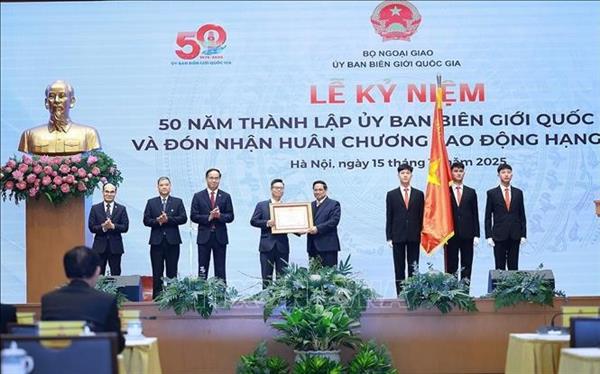Hanoi, April 5 (VNA) - Market observers see a positive outlook in the long term for Vietnamese confectionery exports.
Their optimism is based on a steady double-digit growth in export value for several years and an upward tick in investment and production expansion by local firms.
According to the Business Monitor International (BMI), the nation’s confectionery sector has experienced a relatively high and stable growth rate and it is forecast to earn revenues of 40 trillion VND (1.8 billion USD) in 2018.
China, the United States and Cambodia were the top three importers of Vietnamese confectionery last year, followed by Japan and the Republic of Korea. China is set to maintain its leading position this year, with import growth estimated at over 40 percent.
Confectionery exports went up 15 percent year-on-year in 2016 with an export value of 532 million USD, the Ministry of Industry and Trade (MoIT) estimates. The export value in 2015 was 463 million USD.
The growth in exports and better prospects have spurred investment in the industry, the MoIT has said.
To promote cooperation between Vietnamese enterprises and experienced international confectioners, the German Bakers’ Confederation and the organising committee of the international trade fair for bakery, confectionery and snacks (IBA 2018) are treating Vietnamese enterprises as significant partners, according to the Dau Tu (Investment) newspaper.
The IBA has been a rendezvous for experts in the bakery, pastries, and snack industries since 1949. It is a platform for innovation and provides a complete overview of all novelties in the market. IBA 2018 will take place from September 15-20 in Munich, Germany.
Nguyen Trung Chinh, representative of the GHM Company in Vietnam, an affiliate of Munich-based GHM Gesellschaft für Handwerksmessen mbH, said Vietnamese confectionery products are capturing the attention of foreign investors.
"In early April, GHM General Director Diether Dohr will come to Vietnam to meet with local confectionery companies, and introduce them to German manufacturers and importers,” Chinh said.
With improved quality, modern packaging and a more diverse range of products, the Vietnamese confectionery industry is developing strongly, especially in the premium segment.
Statistics compiled by the MoIT show that imported confectionery now accounts for 30 percent of the market share. In 2016, Vietnam’s confectionery imports reached over 250 million USD, up 20 percent year-on-year.
A representative of the Phu Hung Securities Corporation told Dau Tu that the confectionery industry is not just looking at huge export potential, but also a surge in import earnings.
"With a large and young population, Vietnam’s average confectionery consumption is currently about 2 kilogrammes per person per year (lower than the world average of 3 kilogrammes per person per year). Confectionery consumption among the 65 percent of the population that live in rural areas, which means that that there are plenty of market opportunities for both confectionery makers and traders, " he said.
Confectioners like Bibica Corporation, which has popular brands like Hura, Choco Bella, Orienko, Zoo, are trying to maintain and strengthen their market position.
The Dau Tu report notes that besides building a new plant in Hung Yen province, Bibica is preparing to operate its 12 million USD cupcake production line.
The company has also implemented a 3.3 million USD project to produce the Hifat soft candy and has another project worth over 670,000 USD to produce round cakes.
The Hai Ha Confectionery Joint Stock Company, another well-known firm, is building a new factory with a daily capacity of about 62 tonnes a day in Bac Ninh province.
Vu Quoc Tuan, deputy manager of external relations and internal communications department with confectioner Mondelez Kinh Do Vietnam, said that imported candy has triggered fierce competition in the country’s confectionery market.
He said: "This is the necessary motivation for local manufacturers to invest more in new production technology, improve product variety and enhance product quality, serving the diverse demands of demand of domestic and international consumers."
Their optimism is based on a steady double-digit growth in export value for several years and an upward tick in investment and production expansion by local firms.
According to the Business Monitor International (BMI), the nation’s confectionery sector has experienced a relatively high and stable growth rate and it is forecast to earn revenues of 40 trillion VND (1.8 billion USD) in 2018.
China, the United States and Cambodia were the top three importers of Vietnamese confectionery last year, followed by Japan and the Republic of Korea. China is set to maintain its leading position this year, with import growth estimated at over 40 percent.
Confectionery exports went up 15 percent year-on-year in 2016 with an export value of 532 million USD, the Ministry of Industry and Trade (MoIT) estimates. The export value in 2015 was 463 million USD.
The growth in exports and better prospects have spurred investment in the industry, the MoIT has said.
To promote cooperation between Vietnamese enterprises and experienced international confectioners, the German Bakers’ Confederation and the organising committee of the international trade fair for bakery, confectionery and snacks (IBA 2018) are treating Vietnamese enterprises as significant partners, according to the Dau Tu (Investment) newspaper.
The IBA has been a rendezvous for experts in the bakery, pastries, and snack industries since 1949. It is a platform for innovation and provides a complete overview of all novelties in the market. IBA 2018 will take place from September 15-20 in Munich, Germany.
Nguyen Trung Chinh, representative of the GHM Company in Vietnam, an affiliate of Munich-based GHM Gesellschaft für Handwerksmessen mbH, said Vietnamese confectionery products are capturing the attention of foreign investors.
"In early April, GHM General Director Diether Dohr will come to Vietnam to meet with local confectionery companies, and introduce them to German manufacturers and importers,” Chinh said.
With improved quality, modern packaging and a more diverse range of products, the Vietnamese confectionery industry is developing strongly, especially in the premium segment.
Statistics compiled by the MoIT show that imported confectionery now accounts for 30 percent of the market share. In 2016, Vietnam’s confectionery imports reached over 250 million USD, up 20 percent year-on-year.
A representative of the Phu Hung Securities Corporation told Dau Tu that the confectionery industry is not just looking at huge export potential, but also a surge in import earnings.
"With a large and young population, Vietnam’s average confectionery consumption is currently about 2 kilogrammes per person per year (lower than the world average of 3 kilogrammes per person per year). Confectionery consumption among the 65 percent of the population that live in rural areas, which means that that there are plenty of market opportunities for both confectionery makers and traders, " he said.
Confectioners like Bibica Corporation, which has popular brands like Hura, Choco Bella, Orienko, Zoo, are trying to maintain and strengthen their market position.
The Dau Tu report notes that besides building a new plant in Hung Yen province, Bibica is preparing to operate its 12 million USD cupcake production line.
The company has also implemented a 3.3 million USD project to produce the Hifat soft candy and has another project worth over 670,000 USD to produce round cakes.
The Hai Ha Confectionery Joint Stock Company, another well-known firm, is building a new factory with a daily capacity of about 62 tonnes a day in Bac Ninh province.
Vu Quoc Tuan, deputy manager of external relations and internal communications department with confectioner Mondelez Kinh Do Vietnam, said that imported candy has triggered fierce competition in the country’s confectionery market.
He said: "This is the necessary motivation for local manufacturers to invest more in new production technology, improve product variety and enhance product quality, serving the diverse demands of demand of domestic and international consumers."
VNA/VNP

















